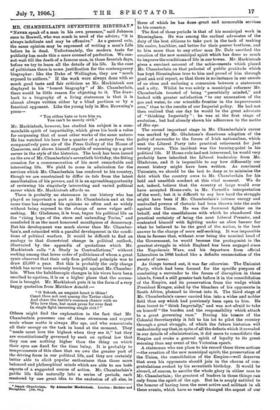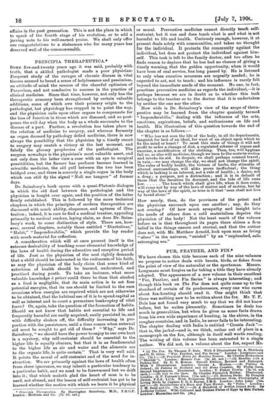MR. CHAMBERLAIN'S. SEVENTIETH BIRTHDAY.*
"Nsvant speaketsman in his own presence," said Johnson once to Boswell, who was much in need of the advice; "it is always indelicate and may be offensive." As a general rule, the same opinion.may be expressed of writing a man's Life before he is dead. Unfortunately, the modern taste for publicity haa made thin a mere eounsel of perfection. We can-- not wait till the death of a famous man, in these feverish days, before we try to learn, all the details of his life. In the case
of politicians there is some justification for the contemporary biographer : like the Duke of Wellington, they are "much exposed to authors." If the work were always dons with so much good taste and fair criticism as Mr. Mackintosh nas displayed in his "honest biography" of Mr. Chamberlain, there would be little reason for objecting to it. The draw- back to a biography of a living statesman is that it is almost always written either by a blind partisan or by a fanatical opponent. Like the young lady in Mrs. Browning 's
poem-
" You either hate or love him so, You can't be merely civil."
Mr. Mackintosh, however, has studied. his subject in a com- mendable spirit of impartiality, which gives his book a value far surpassing that of most other works of the same nature. He has watched his hero for a quarter of a century from the comparatively pure air of the Press Gallery of the House of Commons, and shows himself capable of summing up a great career in the style of the historian. The book has been issued on the eie of Fir. Chamberlain's seventieth birthday, the fitting occasion for a commemoration of his most remarkable and interesting life. We yield to none in admiration for the services which Mr. Chamberlain has rendered to his country,
though we are constrained to differ in tote from the latest manifestation of his powers, and it is an agreeabbsopportunity of reviewing his singularly interesting and varied political career which Mr. Mackintosh affords us.
There ia probably no statesman in our history who has played so important a part as Mr. Chamberlain and at the same time has changed his opinions so often and so widely without being exposed to the charge of mere vulgar self- seeking. Mr. Gladstone, it is true, began his political life as the "rising hope of the stern and unbending. Tories," and concluded it as the most honoured mouthpiece of democracy. But his development was much slower than Mr. Chamber- lain's, and coincided with a parallel development in the condi- tions of political warfare. It would be difficult to find an analogy to that diametrical change in political outlook, illustrated by the - appendix of quotations which Mr. Mackintosh . calls. "A Study in Contradictions," without seeking among that lower order of politicians of whom a great cynic observed that their only firm political principle was to din.w 25,000' a year. But this is probably the only charge which has never been seriously brought against Mr. Chamber-
lain. When the kaleidoscopic changes in his views have been ascribed to egotism, it is on a higher plane that the accusa- tion is brought. lir: Mackintosh puts it in the form of a very happy quotation from Matthew Arnold :— " 0 Sohrab, an unquiet heart is thine! Canst thou not rest among the Tartar chiefs And share the battle's common chance with us Who love thee; but must press for ever first In single fight incurring single risk ?"
Others might find the explanation' in the fact that Mr
Chamberlain possesses one of those strenuous and urgent souls- whose motto is always Hoc age, and who concentrate all their energy on. the task in hand at the moment. They
needs must love the highest. when they see it;" but they are-constitutionally governed by such an optical law that they can see nothing higher than the thing on which their eyes. are fixed for the time being. It is probably to temperaments of this class that we • owe the greater part of the driving force in our, political life, and they are certainly better able to elicit popular enthusiasm than those more balanced and philosophical minds which are able to see both aspects of a. suggested course of action. Mr. Chamberlain's public life falls naturally into a series of periods, each mastered- by one great idea to the exclusion of all else, in
.Tesept. Chamberlain. By Alszandsr. Mackintosh. London : /Udder and. Stoughton. [10s. 6d.]
three of which he has done great and memorable services to his country.
The first of these periods is that of his municipal work in Birmingham. He was • among the earliest advocates of the duty of the best citizens to take part in the task of making life easier, healthier, and better for their poorer brethren, and to him more than to any other man Dr. Dale ascribed the creation of the new municipal spirit which has done so much to improve the conditions-of life in our towns. Mr. Mackintosh gives a succinct account of the achievements which placed Mr. Chamberlain on that pedestal of public gratitude which has kept Birmingham true to him and proud of him through good and evil report, so that there is no instance in our annals of so close and enduring a connexion between a statesman and a city. Whilst he was solely a municipal reformer Mr. Chamberlain boasted of being "parochially minded," and looked with greater satisfaction " to our annexation of the gas and water, to our scientific frontier in thefl improvement area," than to the results of our Imperial policy. He had not. then realised that one day he would be the great advocate of "thinking Imperially " : he was at the first stage of evolution, but had already shown his adherence to the motto of Hoc age.
The second important stage in Mr. Chamberlain's career. was marked by Hr. Gladstone's disastrous adoption of the policy of surrender to the forces of Irish nationalism, which. sent the Liberal. Party into practical retirement, for just twenty years. This incident was the turning-point in his political life. If Home-rule had not intervened, he would very probably have inherited the Liberal leadership from Mr. Gladstone, and it ia impossible to say how differently our recent history might have been written. As convinced Unionists, we should be the last to deny or to minimise the debt which the country owes to Mr. Chamberlain for his bold and unselfish conduct at this vital moment. We do not, indeed, believe that the country at large would ever have accepted Home-rule, in Mr. Parnell's interpretation of the word; but it is difficult to say how hard the struggle might have been if Mr. Chamberlain's intense energy and. unrivalled powers of rhetoric bad been thrown into the scale against the Union. He was the foremost fighter on its behalf, and the unselfishness with which he abandoned the practical certainty of being the next Liberal Premier, and contented himself with fighting under an alien banner for what he believed to be the good of the nation, is the besto answer to the charge of mere self.seeking. It was impossible then to foresee that, without ever being the nominal head of the Government, he would become the protagonist in the greatest struggle in which England has been engaged since the Napoleonic. Wars, and his departure from official Liberalism in 1886 looked like a definite renunciation of the sweets of nower: As things turned out, it was far otherwise. The Unionist Party, which had been formed for the specific purpose of combating a surrender to the forces of disruption in these islands, found a still greater task before it in the consolidation of the Empire, and its preservation from the wedge which ,President Kruger, aided by the blunders of his opponents in South Africa, planned to thrust, into it. The third stage of Mr. Chamberlain's career carried him into a wider and nobler field than any which had previously been open to him. He then learnt to " think Imperially," and was not afraid to take on himself "the burden and the responsibility which attach 'to a great governing race." During his tenure of the Colonial Secretaryship it fell to his lot to pilot the country through a great struggle, of which the future historian will undoubtedly say that, in spite of all the defects which it revealed in our details of administration, it did more to consolidate the Empire and evoke a general spirit of loyalty to its great meaning than any event of the Victorian epoch.
A statesman who can place to his record these three actions —the creation of the new municipal spirit; the preservation of the Union, the consolidation of the Empire—well deserves that even his opponents should join in the chorus of con- gratulations evoked by his seventieth birthday. It would be absurd, of course, to ascribe the whole glory in either ease to Mr-Chamberlain; the greatest of leaders in these things can only focus the spirit of the age. But he is amply entitled to the honour of having been the most active and militant in all these events, which have so vastly changed the aspect of our affairs in the past generation. This is not the place in which to speak of the fourth stage of his evolution, or to add a jarring note to his well-earned praise. We shall only offer our congratulations to a statesman who for many years has deserved well of the commonwealth.



















































 Previous page
Previous page